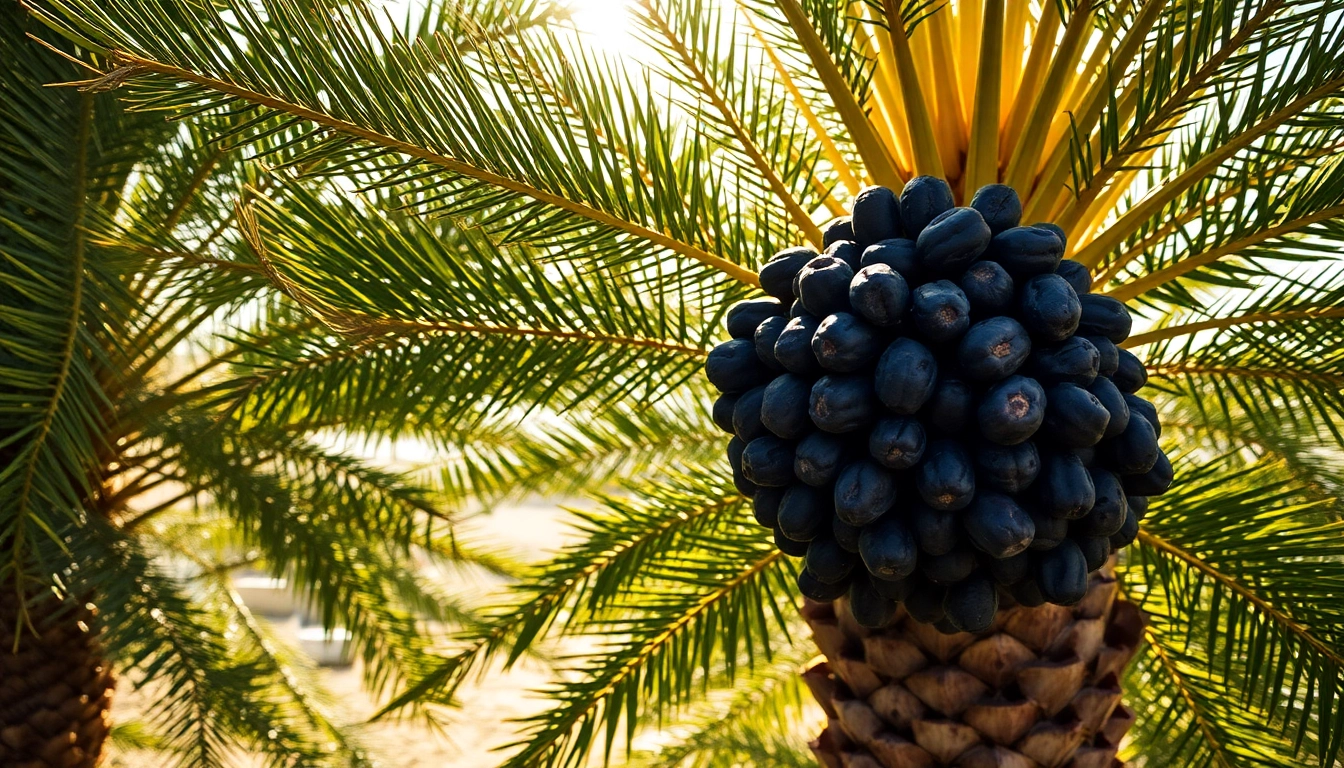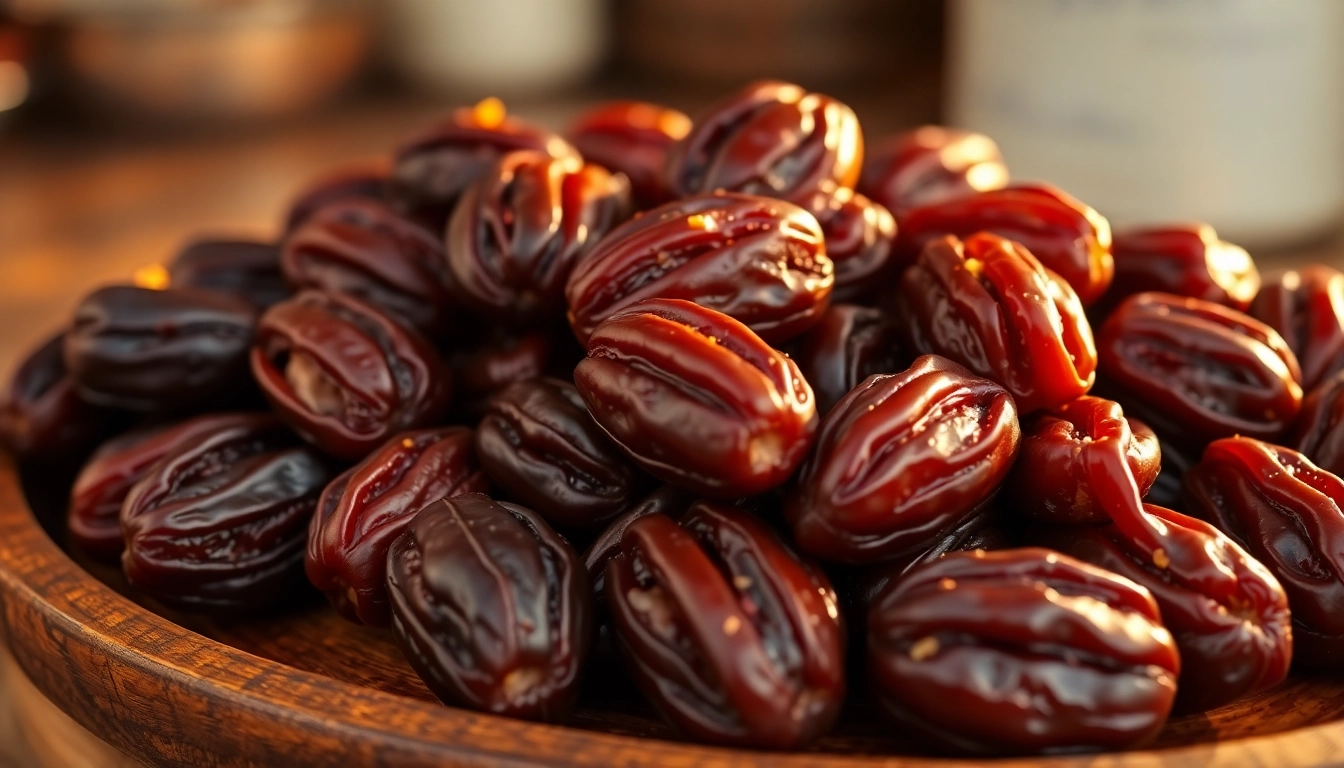Understanding Ajwa Dates
Ajwa dates are not just a common variety of dates; they are a significant cultural and nutritional staple, especially in the Middle East. Known for their distinctive flavor and numerous health benefits, Ajwa dates are cultivated primarily in Medina, Saudi Arabia. Often referred to as “the Prophet’s dates,” they carry a special cultural reverence in Islamic tradition. In this article, we will dive deep into the origin, nutritional profile, and the unique characteristics that make Ajwa dates a sought-after choice for consumers worldwide. You can learn more about these dates through Ajwa Dates at our site.
Origin and Cultivation of Ajwa Dates
The origin of Ajwa dates can be traced back to the oasis of Medina, where they have been grown for centuries. This region’s unique climate and soil conditions contribute to the distinct quality of Ajwa dates, which are oval-shaped and medium-sized with a deep brown to black skin. They are known for their soft, chewy texture and rich flavor profile, often described as sweet with notes resembling caramel and honey.
Ajwa date palms thrive in hot, arid climates and are cultivated through traditional farming methods that have been passed down through generations. This cultivation process includes hand-pollination and careful harvesting to ensure the best quality and taste. Ajwa dates are usually harvested between August and December, with peak production occurring in September and October when the dates reach optimal sweetness.
Nutritional Profile of Ajwa Dates
Ajwa dates are packed with essential nutrients, making them a highly nutritious food choice. A serving of Ajwa dates (about 100 grams) typically contains:
- Calories: 277
- Carbohydrates: 75 grams
- Dietary Fiber: 7 grams
- Protein: 2 grams
- Fat: 0.2 grams
- Potassium: 696 mg (20% of the daily value)
- Magnesium: 54 mg (14% of the daily value)
- Iron: 0.9 mg (5% of the daily value)
The high fiber content aids digestion, while the potassium and magnesium levels support heart health and muscle function. Moreover, Ajwa dates are rich in antioxidants, particularly flavonoids, which play a crucial role in reducing oxidative stress and inflammation in the body.
Ajwa Dates Varieties and Characteristics
While Ajwa dates are recognized for their distinct attributes, they come in various grades based on size, taste, and texture. The most notable characteristics include:
- Flavor: Ajwa dates have a unique taste that combines sweetness with a slight nuttiness, often enhanced by their chewy texture.
- Texture: They are generally softer than other dates, offering a melt-in-the-mouth sensation that many consumers find appealing.
- Color: The color of Ajwa dates can range from dark brown to nearly black, indicating ripeness and richness in flavor.
The superior quality of Ajwa dates, coupled with their religious and cultural significance, makes them a favorite among consumers both for personal consumption and gifting.
Health Benefits of Ajwa Dates
The health benefits associated with Ajwa dates are numerous, contributing to their status as a health food. From boosting immunity to aiding digestion, Ajwa dates are a multifaceted superfood worth exploring.
Boosting Immunity with Ajwa Dates
One of the remarkable benefits of Ajwa dates is their potential to enhance the immune system. Rich in antioxidants, these dates combat free radicals in the body, thereby reducing the risk of chronic diseases. Studies suggest that regular consumption of Ajwa dates may bolster the immune response and help fight off infections, making them a great addition to any diet.
Moreover, the presence of certain vitamins and minerals, such as vitamin C and zinc, further supports immune health. By incorporating Ajwa dates into your daily routine, you could effectively strengthen your body’s defenses.
Digestive Health Benefits of Ajwa Dates
Ajwa dates are an excellent source of dietary fiber, crucial for maintaining healthy digestion. Fiber helps regulate bowel movements and prevents constipation. A high-fiber diet has been linked to improved gut health and reduced risks of developing conditions such as colon cancer.
Furthermore, Ajwa dates contain soluble fiber that helps balance blood sugar levels and supports heart health. Including Ajwa dates in your diet can promote overall digestive well-being and contribute to a healthier gut microbiome.
Ajwa Dates and Lactation: Myths and Facts
There are widespread beliefs about Ajwa dates’ ability to enhance lactation among nursing mothers. While scientific studies on this specific claim are limited, the nutritional profile of Ajwa dates suggests that they may have beneficial properties for lactating women.
The high fiber content can aid digestion and alleviate common postpartum issues, while the abundance of vitamins and minerals may support the overall health of both mother and baby. As many natural foods are known to enhance breast milk production, incorporating Ajwa dates could be a nutritious addition to a lactating mother’s diet.
Culinary Uses of Ajwa Dates
Ajwa dates are not only a health booster but also an excellent ingredient in various culinary applications. Their rich flavor and natural sweetness make them versatile for numerous dishes.
Recipes Featuring Ajwa Dates
Here are some creative recipes that showcase the sweetness and nutritional benefits of Ajwa dates:
- Ajwa Date Smoothie: Blend Ajwa dates with yogurt, banana, and almond milk for a nutrient-packed breakfast smoothie.
- Ajwa Date Energy Balls: Combine chopped Ajwa dates with nuts, oats, and a dash of cocoa powder for a quick and healthy snack.
- Stuffed Ajwa Dates: Fill pitted Ajwa dates with goat cheese and walnuts to create an elegant appetizer perfect for gatherings.
These recipes not only offer delicious ways to enjoy Ajwa dates but also highlight their versatility in both sweet and savory dishes.
Incorporating Ajwa Dates into Daily Diet
Integrating Ajwa dates into your daily diet is relatively easy. Here are some practical tips:
- Add chopped Ajwa dates to your morning oatmeal or cereal for enhanced sweetness and texture.
- Use them as a natural sweetener in baking recipes, replacing refined sugars in cookies and cakes.
- Incorporate Ajwa dates into salads alongside nuts and cheese for a sweet contrast.
- Enjoy Ajwa dates as a standalone snack, paired with nuts or yogurt to balance the nutritional profile.
Emphasizing whole foods like Ajwa dates in your daily meals can contribute to a balanced and healthy lifestyle.
Ajwa Dates in Traditional Arabic Cuisine
In Arabic culture, Ajwa dates play a pivotal role in both daily life and special occasions. They are often served during Ramadan to break fast due to their high energy content and nutritional value. Additionally, they feature prominently in traditional dishes like:
- Harees: A wheat and meat porridge that can be enhanced with Ajwa dates for natural sweetness.
- Maamoul: A type of stuffed pastry that often includes Ajwa dates mixed with nuts and spices.
These culinary applications not only celebrate the rich flavors of Ajwa dates but also highlight their cultural significance in Middle Eastern heritage.
A Comparison: Ajwa Dates and Other Varieties
When considering various date options available on the market, it’s essential to understand how Ajwa dates measure up against other popular varieties, such as Medjool dates. This section will compare their nutritional profiles, flavors, and uses.
Ajwa vs. Medjool Dates: Key Differences
Ajwa and Medjool dates differ significantly in texture and sweetness levels. Medjool dates are larger, sweeter, and have a softer, more caramel-like texture, making them a favorite for quick energy snacks.
Conversely, Ajwa dates are smaller, with a unique flavor that combines sweetness and a hint of nuttiness, setting them apart for those who prefer a less sugary option. Nutritionally, Ajwa dates are also lower in calories and higher in fiber content.
Ultimately, choosing between Ajwa and Medjool dates largely depends on individual taste preferences and dietary needs.
Why Choose Ajwa Dates over other Dates?
Choosing Ajwa dates over other varieties provides numerous advantages. Apart from their unique taste and texture, Ajwa dates carry significant cultural and religious importance in Islam, often associated with various health benefits.
The rich antioxidant profile and lower sugar content combined with their historical significance make Ajwa dates a more appealing choice for health-conscious consumers and those seeking a connection to cultural traditions.
Flavor Profile Comparison of Ajwa Dates
The flavor profile of Ajwa dates is distinctively complex compared to other date varieties. They offer a mild sweetness with hints of caramel, honey, and a rich, chewy texture. This flavor complexity makes Ajwa dates a versatile ingredient in both sweet and savory dishes, appealing to diverse culinary applications.
In contrast, Medjool dates tend to have a more pronounced sweetness and a softer texture, making them ideal for snacking or desserts. As a result, the choice between Ajwa and Medjool dates may depend on the intended use—cooking, baking, or simply enjoying as a snack.
Where to Buy Ajwa Dates
Finding high-quality Ajwa dates is essential for enjoying their nutritional benefits and rich flavor. Available online and in specialty stores, selecting the right source is crucial.
Top Online Stores for Authentic Ajwa Dates
When it comes to purchasing Ajwa dates online, several reputable retailers offer authentic products:
- Bateel: Known for its premium dates, Bateel offers a range of Ajwa date products.
- Amazon: Various sellers provide certified organic Ajwa dates with customer reviews for quality assurance.
- Walmart: A convenient option that may have Ajwa dates in stock, available for both in-store pickup and delivery.
By focusing on trusted retailers, you can ensure that you are purchasing genuine Ajwa dates that meet quality standards.
Buying Ajwa Dates: Tips for Quality Selection
Choosing the best Ajwa dates requires some consideration. Here are tips to ensure quality selection:
- Check for moisture content; high-quality dates should feel slightly moist but not sticky.
- Avoid dates that appear shriveled or overly dry, as this may indicate they are past their prime.
- Look for products labeled as organic and non-GMO for the best health benefits.
By paying attention to these factors, you can enhance your chances of buying high-quality Ajwa dates that deliver both flavor and nutrition.
Pricing Trends for Ajwa Dates in the Market
The price of Ajwa dates can vary widely depending on the quality, packaging, and origin. On average, you can expect to pay between $10 to $20 per pound for premium Ajwa dates. Factors influencing pricing include:
- Origin: Dates sourced directly from Medina may carry a premium due to their authenticity and cultural significance.
- Quality: Higher-grade dates, with larger sizes and superior flavor, typically come at a higher price point.
- Supply and Demand: Seasonal variations can influence prices, especially during Ramadan when demand spikes.
Staying informed about these trends will help you make better purchasing decisions.
Conclusion
In summary, Ajwa dates offer an impressive combination of taste, nutritional benefits, and cultural significance. From boosting immunity and aiding digestion to being a versatile ingredient in the kitchen, these dates hold a special place in both health-conscious diets and cultural traditions. By understanding their origins, unique qualities, and the myriad of ways to incorporate them into your meals, you can appreciate all that Ajwa dates have to offer.



